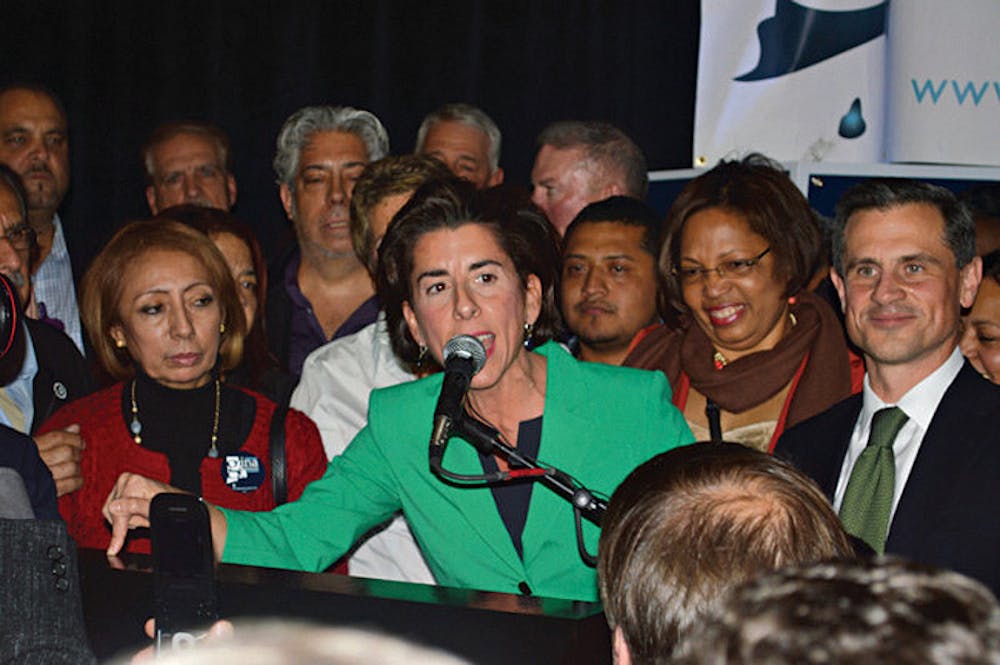On the night she defeated Republican challenger Allan Fung to win the Rhode Island governor’s race, Gina Raimondo proclaimed, “It’s time for new people, a new direction, a culture that includes everyone and not a culture that favors insiders.” One hundred days later, Raimondo has taken preliminary steps toward the fulfillment of that lofty goal, blending the traditional Democratic reliance on the power of government with a no-nonsense, bureaucracy-busting emphasis on efficiency.
The administration has made overhauling Rhode Island’s budget a priority. The state’s fiscal condition is considered poor, ranking 39th in the nation as of last year, according to a report by the Mercatus Center.
Raimondo has begun her efforts to remedy the situation by highlighting the jobs portion of her budget — including a number of tax incentives and investments meant to promote economic growth. She proposed a set of real estate tax incentives for construction, a fund to redevelop land formerly occupied by I-195 and another for loans to small businesses. The plan was introduced to the House Finance Committee April 15.
“Over the course of these first 100 days, my top focus has been on how to jumpstart an economy that is out of gas,” Raimondo wrote in an email to The Herald. “My commitment will remain steadfast for the next 100 days and beyond.”
The Rhode Island State Assembly has displayed an eagerness to work with the governor in pursuit of a remodeled budget. “I was impressed with several of her proposals, and many others are being closely scrutinized by our House Finance Committee,” House Speaker Nicholas Mattiello wrote in an email to The Herald. “There are some significant challenges that we will work on in the weeks ahead.”
Though preliminary indications suggest that Raimondo will prioritize government spending to stimulate economic growth, the administration has also signaled that it plans to streamline Rhode Island’s notoriously ineffective bureaucracy. Of the nine executive orders signed by Raimondo since she took office, three have targeted governmental excess in some capacity.
In February, Raimondo submitted an order to revamp the regulatory process. The order states: “Rules shall not impose an undue burden upon those persons or entities who must comply with the rules.” Later that month, she ordered the creation of a committee to reform Medicaid, and on April 9 she founded the Lean Government Initiative to cultivate “a culture of continuous improvement in state government,” according to the document.
A series of executive orders addressed the historic blizzard of Jan. 27, in which the governor’s office declared a state of emergency and implemented statewide travel bans. The quick response earned widespread praise, the Providence Journal reported.
Raimondo holds the distinction of being the first female governor in the history of Rhode Island, and her campaign priorities reflected her unique position. Five weeks into her term, she announced the creation of an anonymous tip line for the reporting of gender-based wage discrepencies, according to the website PolitiFact.
Equal pay certification status is also in development for companies, granting an official label to those that adhere to practices eliminating the gender wage gap. To these ends, Raimondo announced the reconvening of the Rhode Island Commission on Women March 31.
Nonetheless, Raimondo has faced controversy surrounding gender wage differences. An 8 percent wage gap remains between men and women in the governor’s office. Removing non-technical jobs from the equation, average wages for men rise by 16 percent, while only doing so at a rate of 7 percent for women — increasing the gap even further.
Relations with the State House also faced tension. In February, Raimondo rebuked the General Assembly’s conduct with regards to the state budget, accusing its members of circumventing the governor’s office and acting without transparency. Her comments set her at odds with Speaker Mattiello. “I’m disappointed the governor provided an inaccurate depiction of the budget process to her Washington audience,” he told the Providence Journal.
Looking ahead, Raimondo remains committed to a diverse array of projects. These include the creation of the Rhode Island School Building Authority and a scholarship fund for low-income high school students. Raimondo also hopes to raise the minimum wage, but this initiative may be particularly challenging politically. PolitiFact reports that Raimondo has already dropped her campaign goal of indexing the minimum wage to inflation.
Raimondo has yet to begin building the Rhode Island Innovation Institute, another signature promise of her campaign. She has also expressed a desire to increase gun regulations, improve public transportation and improve tourist facilities statewide.





